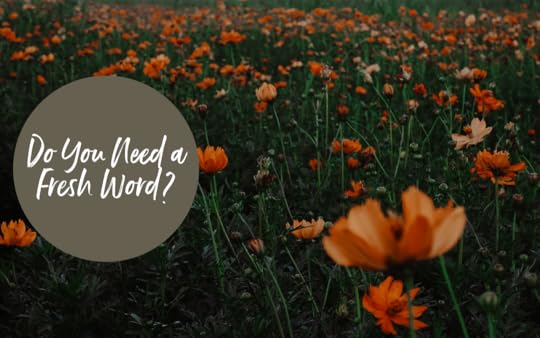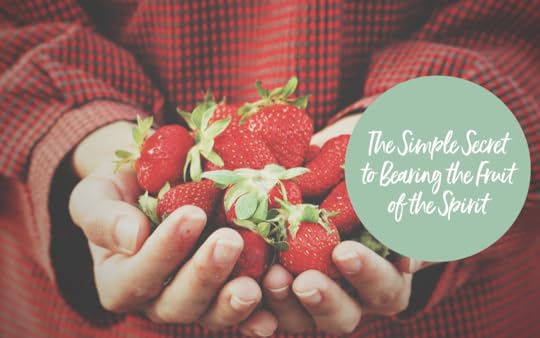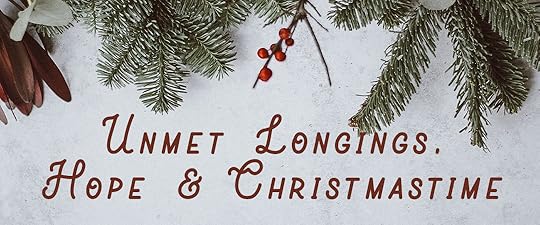Kelly Minter's Blog, page 6
November 13, 2019
WHAT THE FAMILY DINNER TABLE GAVE ME
Filmmaker and journalist Miriam Weinstein once asked in The Surprising Power of Family Meals:
What if I told you that there was a magic bullet—something that would improve the quality of your daily life, your children’s chances of success in the world, your family’s health, our values as a society? Something that is inexpensive, simple to produce and within the reach of pretty much anyone?
You may have guessed her answer: the family dinner table.
Now some of you may be wondering why I’m writing an enthusiastic post about the importance of the family dinner table as someone who has never been married and doesn’t have children. For one thing, I grew up in a family where my mom made dinners for us most nights and I’m still reaping the benefits. But “family” also has a much wider significance than our mere flesh and blood relatives. Jesus shared many significant meals with those who were part of His spiritual family and those who might one day be. When we offer our tables to Jesus and those we’re serving, we create a place where relationships flourish and bodies are nourished. Plus, even without a family of my own, I sit down for dinner in some form or fashion most every night with friends or in-town family.
Our Table Gives Others a Place to Belong
Growing up I could always count on sitting down as a family for dinner. It was grounding to look forward to my mom’s meals and the time together as a stabilizing force in my day, even if my siblings and I fought and complained about the minced onions in the meatloaf. My mom once pointed out that kids are buffeted all day long by things and people; they feel insecure and rejected because their friend has gone after another friend, for example. Dinnertime is a sacred time to draw your kids in, look them in the eye and let them know they belong.
This truth translates into almost any setting, whether you’re single, married, a parent, aunt or uncle, child, or friend. I try to cook and have people at my table as often as I can for the health benefits, yes, but mostly for the deepening of relationships. As we grow older our problems and trials only become more difficult and complex, making the safe harbor of the dinner table an even more meaningful place of respite and restoration. What a delightful gift God has given us in being able to gather around good food and fortify one another in the process.
The Table Cultivates Conversation and Storytelling
It’s no secret we live in a society that’s recently undergone a vast change in its communication habits. What used to be conversations that happened in person or on the phone now take place over texting. Texting may be expedient but it doesn’t help build relationships. The beauty of sitting down with other people around a meal is that face-to-face conversation becomes necessary. The dinner table is a place where we get to learn how to ask good questions, brush up on our listening skills, and refine our storytelling abilities.
Growing up I loved hearing stories like how my parents met, or why they chose my name, or what it was like when my mom finally gave birth to a boy after having three girls. My parents often asked us to share about our day and encouraged us to ask questions of one another. Even when we went through phases where we didn’t feel like talking, or we siblings rolled our eyes at one another, or we were plain grumpy from the school day, we learned how to dialogue and enter into dialogue, even when we didn’t feel like it. I’m thankful for those life skills I’m still drawing on today.
The Dinner Table Gives Us a Reason to Cook and Serve
Cooking and serving others isn’t for the domestic or epicurean elite. We’re all capable of making a simple meal and having people around our table to share it with. Over the years I’ve grown in my cooking and entertaining abilities, which incidentally has been an empowering journey. The empowerment finds its roots in Genesis 1-2 where God gave man and woman dominion over the earth—to cultivate it and be nourished from it. When I prepare a meal I’m actively taking part in the gift God has given us to create, and feed others and ourselves. This feels good!
But cooking has also helped me become a better servant. Shopping for ingredients, chopping vegetables, setting a table, and inviting people into my home is a natural way to serve others. Whether a friend is going through a hard time or a family member has a reason to celebrate, putting on a meal is a tangible way to feed both body and soul.
I know we’re all short on time and have countless reasons why cooking and sitting down together isn’t realistic or feasible. But let me encourage you to start with a simple meal and a 30-minute time frame with your family. If you don’t have a family like myself, invite some friends over. You may then want to graduate to having some neighbors over who you’d like to get to know better. Who knows where the journey will lead? And what matters more than the destination is all the community, good food, and meaningful conversations you’ll have along the way. Ingredients that fast food and texting can never give you.
Check out Kelly’s new cookbook, A Place at the Table.
The post What the Family Dinner Table Gave Me appeared first on LifeWay Voices.

WHAT THE FAMILY DINNER TABLE GAVE ME
by Kelly Minter | Nov 13, 2019 | Bible Study, Encouragement, Family, Holidays
Filmmaker and journalist Miriam Weinstein once asked in The Surprising Power of Family Meals: What if I told you that there was a magic bullet—something that would improve the quality of your daily life, your children’s chances of success in the world, your family’s...

DO YOU NEED A FRESH WORD?
by Kelly Minter | Oct 23, 2019 | Bible Study, Christian Growth, New Testament
For the past year and a half, I’ve been positively captivated by Matthew’s Gospel, specifically how he crafted the material about Jesus’ life in between Matthew 4:23 and 9:35. What Matthew states in 4:23 he repeats in 9:35: Jesus went all over Galilee “teaching in...

THE SIMPLE SECRET TO BEARING THE FRUIT OF THE SPIRIT
by Kelly Minter | Sep 11, 2019 | Christian Growth, New Testament
“Therefore, as God’s chosen ones, holy and dearly loved, put on compassion, kindness, humility, gentleness, and patience” (Colossians 3:12). As followers of Jesus, we’ve all had the feeling of grasping for one of these fruits of the Spirit while wondering if we had a...

WHEN LIFE SEEMS COUNTER TO GOD’S WILL
by Kelly Minter | Aug 5, 2019 | Bible Study, Old Testament
I recently finished writing a Bible study on the life of Joseph. His story is captivating for countless reasons—we all “get” Joseph on some level. We can relate to him. We may never have had a multicolored robe that nearly cost us our lives hanging next to...

HONEYVINE MILKWEED AND THE SNEAKINESS OF SIN
by Kelly Minter | Jul 8, 2019 | Bible Study, Old Testament
I’m battling an invasive weed cropping up in my vegetable garden beds. It surreptitiously twists itself around my tomato vines while somehow looking like part of the team. It’s quick to grow and hard to root out. Its most troubling quality is its ability to blend in...

STUDY THE BIBLE FOR THE SAKE OF OTHERS
by Kelly Minter | May 31, 2019 | Bible Study
I grew up in a church environment where a “Plan of Salvation” was regularly presented. If you prayed the sinner’s prayer, it was generally understood that no matter what happened from there on out, you were saved and good to go. Bibles were sometimes passed out with...

MOSES AND THE MUTUAL BENEFIT OF DELEGATING RESPONSIBILITY
by Kelly Minter | Mar 11, 2019 | Bible Study, Old Testament
The concept of delegating isn’t a new one. Anyone who’s been a leader in any capacity knows that at some point you have to let go of certain pieces of your work. You realize that you can’t get to everything and you’re not good at everything. You see the idea of...

WHEN GOD’S BLESSING TAKES YOU ON A DIFFERENT PATH
by Kelly Minter | Feb 12, 2019 | Bible Study
I remember right where I was in my house. I was listening to Beth Moore give a message out of Genesis 17 and if I’m not mistaken I was listening to her by tape (as in those small plastic rectangles that used to go in tape recorders). I was in my early twenties and...

6 ESSENTIALS FOR SPIRITUAL AND EMOTIONAL HEALTH
by Kelly Minter | Jan 24, 2019 | Christian Growth, Encouragement
Two years ago I began to hit a wall. I was run down and burned out. It wasn’t that I didn’t love the Lord or people anymore. It wasn’t that I’d lost my passion for God’s Word, teaching the Bible, writing, or taking mission trips to the Amazon and Moldova with Justice...

UNMET LONGINGS, HOPE AND CHRISTMASTIME
by Kelly Minter | Nov 30, 2018 | Encouragement, Holidays
Most of us enter Christmastime with anticipation and dread, hope and jadedness, excitement and I’m-already-over-this. Perhaps for most of us, it’s a blend of all of these and more. You may not be able to tell where one emotion ends and the other begins, or even why....
« Older Entries
The post WHAT THE FAMILY DINNER TABLE GAVE ME appeared first on Kelly Minter.
November 11, 2019
Episode #5: Bread
Episode #5: Bread
by Kelly Minter and Regina Pinto | A Place at the Table Podcast
https://kellyminter.com/wp-content/uploads/2019/11/Kelly_Minter_Ep_5_Bread.mp3
Episode #5
In this episode, Kelly and Regina are joined by Kelly’s brother, David Minter, who talks with them about all things bread. Several years ago, David bought a book on how to make bread, tried his hand at making it, and realized how much he enjoyed the craft!
Now deemed by his family as the maker of the best pizza dough ever, David shares some of his tips on how to make bread, what types of bread are healthiest, and how bread-making ultimately points back to how God created us to be.
The key highlights of this episode:
Time and temperature are the two top components to making a good loaf of bread.
Just because a recipe or creation doesn’t turn out exactly how you wanted it doesn’t mean that you should quit. It’s all a part of the process and refining your craft.
If you are new to bread-making, it’s best to start with a “no-knead” recipe that uses instant yeast. Even if you haven’t made bread before, it’s best to just jump in and try it!
God designed us to be producers and creators, so whatever your hobby may be, using your hands to create is part of how God has designed you.
Quotes from Kelly + Regina:
“We are meant to be producers and creators.” – David
“Bread in and of itself is not a bad thing… you’ve just got to make sure you’re working with the right ingredients.” – David
“Let’s get baking, so we can not only enjoy the pleasure of having control over something and creating something but also so that we can nourish our loved ones.” – Kelly
Click here to listen on iTunes!

Want fresh, new recipes each month from Kelly? Join here and get her monthly newsletter.
Success!
First Name
Email
State
The post Episode #5: Bread appeared first on Kelly Minter.
November 4, 2019
Episode #4: Serving People in Your Home
Episode #4: Serving People in Your Home
by Kelly Minter and Regina Pinto | A Place at the Table Podcast
https://kellyminter.com/wp-content/uploads/2019/11/Kelly_Minter_Ep_4_Serving_People_in_Your_Home_-_102619_2.05_PM.mp3
Episode #4
For those of you who love to host dinner parties but struggle when it comes to prepping, planning, and being present, this episode is for you!
As a chef, caterer, and expert dinner party host, Regina shares with us about some of her key tricks and tips for how to prepare your meal ahead of time and how certain planning tools will allow you to be able to spend more time with your guests without the stress of getting the food out on the table.
The key highlights of this episode:
Nothing will ever fully be perfect when hosting a dinner party – and that’s okay. The point is not perfection; it’s being able to be ready so that you can be present with your guests.
Pace yourself. The best way to do that is planning ahead of time, including what is on your menu, how many people are coming, and the ways you are going to keep your food warm.
Don’t let the stress of getting the food together for a dinner party keep you from inviting guests over! Using these tips and any of your own methods, practice preparing food ahead of time, and don’t be afraid to ask a friend for help.
Quotes from Kelly + Regina:
“If we are prepared ahead of time… then we are more present for our guests.” – Kelly
“We want community – we want to take as many barriers out of the way.” – Kelly
Click here to listen on iTunes!

Want fresh, new recipes each month from Kelly? Join here and get her monthly newsletter.
Success!
First Name
Email
State
The post Episode #4: Serving People in Your Home appeared first on Kelly Minter.
October 24, 2019
Episode 3: Gardening and Eating Seasonally
Episode 3: Gardening and Eating Seasonally
by Kelly Minter and Regina Pinto | A Place at the Table Podcast
https://kellyminter.com/wp-content/uploads/2019/10/Kelly_Minter_Ep_4_Gardening_and_Eating_Seasonally_-_101519_6.46_PM.mp3
Episode #3
Whether you have several vegetable gardens at home or if you haven’t grown a thing in your life, Kelly and Regina talk in this episode about the beauty and miracle of gardening and seeing plants grow, and how this growth points to our Creator and our dependency upon Him.
Along with that, Kelly and Regina highlight the significance of cooking and eating seasonally. They touch on what our role is in teaching the younger generations about gardening and seasonal eating, and how those go hand in hand with the cycles of life and anticipation in God’s creation.
The key highlights of this episode:
Beyond just the physical growth of a particular plant or food, gardening is a task that makes us more thankful for food and cooking, and it allows us to see God’s grace and goodness.
Each season has certain foods that are prime for that time of the year. This points us to Ecclesiastes 3:1-8 where we see God’s ordainment and importance of the seasons.
Pruning in a garden reflects God’s pruning work in our lives, with Jesus as our Vine and God the Father as our Gardener. (John 15)
Gardening can be a therapeutic act in a busy and connected society and gives us time of solitude and time alone with God.
Quotes from Kelly + Regina:
“Gardening and cooking really help me to be in awe of the Creator, and it shows me how dependent ultimately I am on the goodness of God.” – Kelly
“He does everything for good.” – Regina
“Everything has its time and seasons.” – Kelly
Click here to listen on iTunes!

Want fresh, new recipes each month from Kelly? Join here and get her monthly newsletter.
Success!
First Name
Email
State
The post Episode 3: Gardening and Eating Seasonally appeared first on Kelly Minter.
October 22, 2019
DO YOU NEED A FRESH WORD?
For the past year and a half, I’ve been positively captivated by Matthew’s Gospel, specifically how he crafted the material about Jesus’ life in between Matthew 4:23 and 9:35. What Matthew states in 4:23 he repeats in 9:35: Jesus went all over Galilee “teaching in their synagogues, preaching the good news of the kingdom, and healing every disease and sickness among the people.” Matthew tells us in both verses what he shows us in between—that Jesus’ ministry was made up of both healing and teaching. In Matthew 5-7 we get Jesus’ Sermon on the Mount (the teachings of Jesus), and in chapters 8-9 we get an assortment of His miracles and healings.
MORE THAN MIRACLES
I’ve been moved and inspired by Matthew’s writings because he’s reminded me that Jesus’ teachings are as majestic as His miracles. So often I’ve prayed for Jesus to move spectacularly in my life and the lives of others, to do the marvelous, to work miracles. But do I see the power of His teaching, and incidentally my obedience to His Word, as important as His supernatural workings? For clarity, I think it is good and right for us to long and pray for Him to do great and mighty things that are absolutely outside of our abilities to accomplish. After all, Matthew goes out of his way in chapters 8 and 9 to highlight the extraordinary power and authority that Jesus has over sickness, disease, darkness, and sin. They’re astounding chapters that I’ve benefited from reflecting on and studying over the past several months. But we can’t forget that Jesus’ teachings are as powerful as His miracles. They both hold tremendous power to change our lives.
Jesus’ miracles were astounding to the crowds, but so were His words!Click To Tweet
ASTONISHED AT HIS TEACHING
After Jesus gave His Sermon on the Mount, Matthew records that “The crowds were astonished at his teaching” (Matthew 7:28). Jesus taught with a power and authority that the crowds had never before experienced. He spoke with a conviction the scribes and Pharisees couldn’t begin to rival. Jesus’ miracles were astounding to the crowds, but so were His words! Being reminded of the preeminence of Jesus’ teaching in Matthew’s gospel has inspired me to better learn from Christ, not only so He can change my life, but also so I can articulate His words to others. I’m thinking of the broken marriages around me, the fractured friendships, the jealousy that festers and steals our joy, the unforgiveness that robs us of moving forward. Wherever we find ourselves Jesus has hopeful and restorative words for us—we must listen and put them into practice.
To emphasize this truth, a bit later in Matthew’s gospel Jesus says, “Come to me, all of you who are weary and burdened, and I will give you rest. Take up my yoke and learn from me, because I am lowly and humble in heart, and you will find rest for your souls. For my yoke is easy and my burden is light” (Matthew 11:28-30). I was freshly reminded of the significant place that learning from Jesus must have in our everyday lives. Our rest, restoration, and direction are dependent upon it. Sometimes we want the miracle when the miracle is that God spoke to us through His Son Jesus, and we simply need to listen and obey.
No doubt Jesus calls us to a radical obedience of loving those who have betrayed us, putting away our anger, making things right with our neighbor, forgiving as we’ve been forgiven, ceasing to worry, generously giving, and so on… We can’t miss that the grace Jesus gives us to obey His words is a miracle in itself.
Would you like an excerpt of Kelly’s Finding God Faithful Bible Study?
Click HERE to sign up and it will be delivered straight to your inbox.
This post was originally seen on lifewayvoices.com.

DO YOU NEED A FRESH WORD?
by Kelly Minter | Oct 23, 2019 | Bible Study, Christian Growth, New Testament
For the past year and a half, I’ve been positively captivated by Matthew’s Gospel, specifically how he crafted the material about Jesus’ life in between Matthew 4:23 and 9:35. What Matthew states in 4:23 he repeats in 9:35: Jesus went all over Galilee “teaching in...

THE SIMPLE SECRET TO BEARING THE FRUIT OF THE SPIRIT
by Kelly Minter | Sep 11, 2019 | Christian Growth, New Testament
“Therefore, as God’s chosen ones, holy and dearly loved, put on compassion, kindness, humility, gentleness, and patience” (Colossians 3:12). As followers of Jesus, we’ve all had the feeling of grasping for one of these fruits of the Spirit while wondering if we had a...

WHEN LIFE SEEMS COUNTER TO GOD’S WILL
by Kelly Minter | Aug 5, 2019 | Bible Study, Old Testament
I recently finished writing a Bible study on the life of Joseph. His story is captivating for countless reasons—we all “get” Joseph on some level. We can relate to him. We may never have had a multicolored robe that nearly cost us our lives hanging next to...

HONEYVINE MILKWEED AND THE SNEAKINESS OF SIN
by Kelly Minter | Jul 8, 2019 | Bible Study, Old Testament
I’m battling an invasive weed cropping up in my vegetable garden beds. It surreptitiously twists itself around my tomato vines while somehow looking like part of the team. It’s quick to grow and hard to root out. Its most troubling quality is its ability to blend in...

STUDY THE BIBLE FOR THE SAKE OF OTHERS
by Kelly Minter | May 31, 2019 | Bible Study
I grew up in a church environment where a “Plan of Salvation” was regularly presented. If you prayed the sinner’s prayer, it was generally understood that no matter what happened from there on out, you were saved and good to go. Bibles were sometimes passed out with...

MOSES AND THE MUTUAL BENEFIT OF DELEGATING RESPONSIBILITY
by Kelly Minter | Mar 11, 2019 | Bible Study, Old Testament
The concept of delegating isn’t a new one. Anyone who’s been a leader in any capacity knows that at some point you have to let go of certain pieces of your work. You realize that you can’t get to everything and you’re not good at everything. You see the idea of...

WHEN GOD’S BLESSING TAKES YOU ON A DIFFERENT PATH
by Kelly Minter | Feb 12, 2019 | Bible Study
I remember right where I was in my house. I was listening to Beth Moore give a message out of Genesis 17 and if I’m not mistaken I was listening to her by tape (as in those small plastic rectangles that used to go in tape recorders). I was in my early twenties and...

6 ESSENTIALS FOR SPIRITUAL AND EMOTIONAL HEALTH
by Kelly Minter | Jan 24, 2019 | Christian Growth, Encouragement
Two years ago I began to hit a wall. I was run down and burned out. It wasn’t that I didn’t love the Lord or people anymore. It wasn’t that I’d lost my passion for God’s Word, teaching the Bible, writing, or taking mission trips to the Amazon and Moldova with Justice...

UNMET LONGINGS, HOPE AND CHRISTMASTIME
by Kelly Minter | Nov 30, 2018 | Encouragement, Holidays
Most of us enter Christmastime with anticipation and dread, hope and jadedness, excitement and I’m-already-over-this. Perhaps for most of us, it’s a blend of all of these and more. You may not be able to tell where one emotion ends and the other begins, or even why....

LOVING EACH OTHER ON SOCIAL MEDIA
by Kelly Minter | Nov 20, 2018 | Encouragement, Social Media
As we move into the Christmas season my hope is that we'll find ways to bless one another on social media. Perhaps we can think of ways to use our voices to encourage and champion others, instead of merely looking for a platform for our opinions to be heard. Here are...
« Older Entries
The post DO YOU NEED A FRESH WORD? appeared first on Kelly Minter.
October 16, 2019
Episode 2: Help for the Hurried Cook
Episode 2: Help for the Hurried Cook
by Kelly Minter and Regina Pinto | A Place at the Table Podcast
https://kellyminter.com/wp-content/uploads/2019/10/Kelly_Minter_Episode_2_Help_for_the_Hurried_Cook_-_10819_11.24_AM-1.mp3
Episode #2
In a society that is always on the go, in this episode Kelly and Regina cover how to prepare and plan for each week of cooking at home despite the busyness of life.
From grains to meats to everything in between, Kelly and Regina share some of the key ingredients and meals that are best for keeping meals healthy and for making the most of your time. Along with that, they share some of their best tips and principles to meal prepping, how to use your leftovers in new ways, and what the key elements to a healthy meal really are.
The key highlights of this episode:
Planning out your meals for the week will allow you to save time, eat healthy options, and spend your meals around the table.
Keeping certain staple ingredients in your kitchen at all times provides you with the ability to cook certain meals and foods even when you are crunched for time.
Time is so limited, and that’s why you must choose how you are going to use each hour of your day.
Applying planning principles and making cooking a priority gives you the chance to use the gifts He has given us for His glory and to serve others.
Quotes from Kelly + Regina:
“Any time I say yes to something, I’m saying no to something else.” – Kelly
“Community starts at home.” – Regina
“God gave us this food to cultivate and to be able to create with and to be able to govern and use for our nourishment and for the service of other people.” – Kelly
Click here to listen on iTunes!

Success!
First Name
Email
State
Want fresh, new recipes each month from Kelly? Join here and get her monthly newsletter.
The post Episode 2: Help for the Hurried Cook appeared first on Kelly Minter.
October 9, 2019
Episode 1: Community Begins at Home
Episode 1: Community Happens At Home
by Kelly Minter and Regina Pinto | A Place At The Table Podcast
http://traffic.libsyn.com/aplaceatthetable/Kelly_Minter_Ep_1_FINAL_Community_Happens_at_Home_-_10419_9.20_AM.mp3
Episode #1
In this introductory episode, Kelly and Regina talk about Brazilian traditions, all things beans and rice, and how to make cooking a priority in our fast-paced society.
Brazilian born and raised, Regina shares about where her love of cooking and community came from and how her upbringing in the kitchen showed her the importance of teaching the younger generation how to cook. Kelly also shares about God’s design and intention for food and its use and our role in bringing about a comfort and safety to our friends and family around the table.
The key highlights of this episode:
Cooking and sharing food around the table holds the power to bring a family together, to generate safe community, and to encourage gratitude for the gift of food.
God has a design for us to use his creation of food and longs for us to be thoughtful with it. (Genesis 1)
Regardless of your income or status in life, even the simplest meals made with love and care can make a difference in the lives of those around us.
Quotes from Kelly + Regina:
“You have to realize that all of the gifts come from God, and the gifts are not ours alone.” – Regina
“This is not just something that we need for physical nourishment. We need this for spiritual nourishment and for the nourishment of community.” – Kelly
“Community starts at home.” – Regina
“Our best gatherings happen around the table.” – Kelly
Click here to listen on iTunes!

Want fresh, new recipes each month from Kelly? Join here and get her monthly newsletter.
Success!
First Name
Email
State
The post Episode 1: Community Begins at Home appeared first on Kelly Minter.
September 11, 2019
THE SIMPLE SECRET TO BEARING THE FRUIT OF THE SPIRIT
“Therefore, as God’s chosen ones, holy and dearly loved, put on compassion, kindness, humility, gentleness, and patience” (Colossians 3:12).
As followers of Jesus, we’ve all had the feeling of grasping for one of these fruits of the Spirit while wondering if we had a single one to give. A reader once wrote to me, “I think I have plenty of each of the fruits when I don’t need them. It’s when I’m in a trying situation that I discover the fruit I need is the one I’m short of.” I’ve always loved this woman for her honesty because we can all relate to her sentiment. I have patience in droves when everything is going my way. I’m the kindest person I know when people are treating me well. I’ve got humility for days when no one is challenging my pride. You see where I’m headed here…fruits are not fruits until they’re tested.
Which leads us to another challenge: What do we do when we’re trying to heed Paul’s advice to wear these fruits, yet we have very little compassion, kindness, humility, gentleness, or patience growing in our hearts? Not to mention, when we study these fruits we realize that each has a powerful meaning, and Jesus embodied all of them (perhaps another post for another day). In other words, when Paul asks us to put on compassion, kindness, humility, gentleness, and patience, he’s asking something extraordinary of us. This way of living and being around others isn’t something we can simply will ourselves into. I tried to do this for the longest time until Paul’s opening line grabbed my attention: “Therefore, as God’s chosen ones, holy and dearly loved…”
For most of my life, I’d inadvertently leaped straight over these doctrinal principles, not realizing that these truths are the very basis for being able to love one another with the fruits of Jesus. And oh the difference this has made.
TO BE CHOSEN
The Greek word for chosen is eklektos. It means picked out, chosen to obtain salvation through Christ. When we sit in the reality and mystery that God chose us before the foundations of the world to be His adopted son or daughter (Ephesians 1:4-5), our heart can’t help but soften and enlarge. When I truly believe I’m significant to my Savior, the fruits flow more freely from within me.
TO BE SET APART
In addition to being chosen, we’ve been made holy. The Greek word here is hagios, and it means to be set apart for God, to be exclusively His. The word can also mean sacred, unlike or otherness, different. When we’re grounded and settled in the reality that we’ve been set apart for special and sacred purposes within God’s Kingdom, the fruits come more naturally. When we’re secure in our calling, the posture of humility and the ability to cheer for others will flow more freely.
TO BE DEARLY LOVED
Some Bible versions say beloved instead of dearly loved. Both express the deep and beautiful meaning of the Greek word agapao, which is an active love. It means “to be fond of,” “dear,” “precious,” and “costly.” Growing up I sometimes felt more tolerated by God than I did precious to Him. As though I’d barely made the cut as His child. But Paul boldly declared that we are His beloved in Jesus Christ. We won’t be able to effectively embody the fruits of Jesus without first knowing how dearly He loves us.
Simply put, we often try to live the fruits of the Spirit in hopes of being chosen by God, loved by Him, and set apart by Him, when in reality it’s the other way around. Because we are chosen, made holy, and set apart, we are now able to bear the fruit as Jesus has taken up residence in our hearts. While sanctification plays a part in fruitful living, and sanctification takes time, the fruits of compassion, kindness, humility, gentleness, and patience are always accessible to you, because Jesus is the embodiment of them all. And He loves you dearly.
Would you like an excerpt of Kelly’s Finding God Faithful Bible Study?
Click HERE to sign up and it will be delivered straight to your inbox.
This post originally appeared on lifewayvoices.com

THE SIMPLE SECRET TO BEARING THE FRUIT OF THE SPIRIT
by Kelly Minter | Sep 11, 2019 | Christian Growth, New Testament
“Therefore, as God’s chosen ones, holy and dearly loved, put on compassion, kindness, humility, gentleness, and patience” (Colossians 3:12).As followers of Jesus, we’ve all had the feeling of grasping for one of these fruits of the Spirit while wondering if we had a...

WHEN LIFE SEEMS COUNTER TO GOD’S WILL
by Kelly Minter | Aug 5, 2019 | Bible Study, Old Testament
I recently finished writing a Bible study on the life of Joseph. His story is captivating for countless reasons—we all “get” Joseph on some level. We can relate to him. We may never have had a multicolored robe that nearly cost us our lives hanging next to...

HONEYVINE MILKWEED AND THE SNEAKINESS OF SIN
by Kelly Minter | Jul 8, 2019 | Bible Study, Old Testament
I’m battling an invasive weed cropping up in my vegetable garden beds. It surreptitiously twists itself around my tomato vines while somehow looking like part of the team. It’s quick to grow and hard to root out. Its most troubling quality is its ability to blend in...

STUDY THE BIBLE FOR THE SAKE OF OTHERS
by Kelly Minter | May 31, 2019 | Bible Study
I grew up in a church environment where a “Plan of Salvation” was regularly presented. If you prayed the sinner’s prayer, it was generally understood that no matter what happened from there on out, you were saved and good to go. Bibles were sometimes passed out with...

MOSES AND THE MUTUAL BENEFIT OF DELEGATING RESPONSIBILITY
by Kelly Minter | Mar 11, 2019 | Bible Study, Old Testament
The concept of delegating isn’t a new one. Anyone who’s been a leader in any capacity knows that at some point you have to let go of certain pieces of your work. You realize that you can’t get to everything and you’re not good at everything. You see the idea of...

WHEN GOD’S BLESSING TAKES YOU ON A DIFFERENT PATH
by Kelly Minter | Feb 12, 2019 | Bible Study
I remember right where I was in my house. I was listening to Beth Moore give a message out of Genesis 17 and if I’m not mistaken I was listening to her by tape (as in those small plastic rectangles that used to go in tape recorders). I was in my early twenties and...

6 ESSENTIALS FOR SPIRITUAL AND EMOTIONAL HEALTH
by Kelly Minter | Jan 24, 2019 | Christian Growth, Encouragement
Two years ago I began to hit a wall. I was run down and burned out. It wasn’t that I didn’t love the Lord or people anymore. It wasn’t that I’d lost my passion for God’s Word, teaching the Bible, writing, or taking mission trips to the Amazon and Moldova with Justice...

UNMET LONGINGS, HOPE AND CHRISTMASTIME
by Kelly Minter | Nov 30, 2018 | Encouragement, Holidays
Most of us enter Christmastime with anticipation and dread, hope and jadedness, excitement and I’m-already-over-this. Perhaps for most of us, it’s a blend of all of these and more. You may not be able to tell where one emotion ends and the other begins, or even why....

LOVING EACH OTHER ON SOCIAL MEDIA
by Kelly Minter | Nov 20, 2018 | Encouragement, Social Media
As we move into the Christmas season my hope is that we'll find ways to bless one another on social media. Perhaps we can think of ways to use our voices to encourage and champion others, instead of merely looking for a platform for our opinions to be heard. Here are...

3 Questions to Help Approach Social Media with a Servant’s Heart
by Kelly Minter | Oct 30, 2018 | Encouragement, Social Media
Social media has been one of the trickiest territories for me to navigate not only as an author and Bible teacher, but also as a friend, neighbor, and family member. Do I retweet a positive comment about a book I wrote or does that look like self-promotion? If I’m in...
« Older Entries
The post THE SIMPLE SECRET TO BEARING THE FRUIT OF THE SPIRIT appeared first on Kelly Minter.
August 5, 2019
WHEN LIFE SEEMS COUNTER TO GOD’S WILL
I recently finished writing a Bible study on the life of Joseph. His story is captivating for countless reasons—we all “get” Joseph on some level. We can relate to him. We may never have had a multicolored robe that nearly cost us our lives hanging next to our sundresses or ties, and we probably haven’t traveled by camel to a foreign land as a slave. But we patently understand difficult family relationships. We’ve experienced betrayal. Broken dreams have nearly sunk us. We know unfair. And almost every one of us has wondered at some point in our lives, Where is God? If none of those have a familiar ring, surely we can all relate to struggling to forgive someone when forgiveness felt perfectly impossible.
But another part of Joseph’s story stood out to me that is harder to define. Something I’d never seen before. When Joseph was sold as a slave into the foreign and pagan land of Egypt (Gen 37:28) this experience was not only devastating, it also appears to be in the wrong direction. If we go back to God’s covenant with Abraham (Abram) in Genesis 12:1-5, part of God’s promise to Abraham and his descendants was the gift of land, specifically the land of Canaan. What Abraham and Sarah, Isaac and Rebekah, and Jacob and Rachel and Leah (and their children, including Joseph) all got to experience at different times in their lives was life in this land of promise. Canaan was the promised land, not Egypt.
THE GOD OF PROMISE IS BETTER THAN THE LAND OF PROMISE
If Joseph was aware of God’s covenant with Abraham—and I have to believe he was—what must it have felt like for him to be traveling away from Canaan? It’s one thing to suffer in the direction of God’s will; it’s another to suffer when you think you’re heading against it. But what we find explicitly in Genesis 39:1-5, 21-23 is that the Lord was withJoseph in Egypt. We discover that the God of promise is able to dwell outside the land of promise. And that He’s even better than His promises. This, of course, isn’t to suggest that God doesn’t keep His promises or that He runs counter to them. It simply shows us that His presence is better than anything we can imagine, including His gifts.
WHAT SEEMS COUNTER TO GOD’S WILL MAY ACTUALLY BE PART OF IT
If we go back to Genesis 17:13 we see that God told Abraham about a time when his descendants would live as foreigners for four hundred years in a land that wasn’t their own. Again, it’s hard to know how much Joseph knew about these conversations God had with Abraham, but even if Joseph was aware of this information Egypt wasn’t specified. Plus, it would have been really hard for Joseph to put together that he was the one who’d be kicking off this four hundred year stint in a foreign land. On top of the unspeakable pain of being sold as a slave into Egypt, being taken away from Canaan had to be terribly confusing for him on a spiritual level.
Joseph’s story reminds me that when it seems like some part of our life is running counter to God’s will, it’s possible we feel this way because we don’t know the whole story. We don’t have the big picture. Though the first several years of Joseph’s life in Egypt must have felt way outside of God’s plan, Joseph’s detour to Egypt was no detour at all. God would use Egypt as the place where Abraham’s descendants would proliferate into the nation of Israel. Joseph was right where God wanted him.
If our heart is in the right place before God, we can trust that our path will be too.Click To Tweet
IF OUR HEART IS RIGHT BEFORE GOD SO WILL OUR PATH BE
Of course, there are times when we feel like our life is running counter to God’s will because it is. We’re choosing the pleasures of sin over obedience, we’re harboring unforgiveness, we’re going for the money instead of the ministry, or whatever the case may be. But if our heart is in the right place before God, we can trust that our path will be too. And even more so, we can trust that God’s presence will accompany us. And the God of Promise is even better than the land of Promise.
Would you like an excerpt of Kelly’s Finding God Faithful Bible Study?
Click HERE to sign up and it will be delivered straight to your inbox.
This post originally appeared on lifewayvoices.com

WHEN LIFE SEEMS COUNTER TO GOD’S WILL
Aug 5, 2019 | Bible Study, Old Testament
I recently finished writing a Bible...
read more

HONEYVINE MILKWEED AND THE SNEAKINESS OF SIN
Jul 8, 2019 | Bible Study, Old Testament
I’m battling an invasive weed cropping up in my...
read more

STUDY THE BIBLE FOR THE SAKE OF OTHERS
May 31, 2019 | Bible Study
I grew up in a church environment where a “Plan...
read more

WHY WE NEED A RESURRECTION
May 3, 2019 | Justice and Mercy International, Missions, Moldova
Easter has come and gone. The hams, chocolate...
read more

MOSES AND THE MUTUAL BENEFIT OF DELEGATING RESPONSIBILITY
Mar 11, 2019 | Bible Study, Old Testament
The concept of delegating isn’t a new one....
read more
« Older Entries
The post WHEN LIFE SEEMS COUNTER TO GOD’S WILL appeared first on Kelly Minter.
July 8, 2019
HONEYVINE MILKWEED AND THE SNEAKINESS OF SIN
I’m battling an invasive weed cropping up in my vegetable garden beds. It surreptitiously twists itself around my tomato vines while somehow looking like part of the team. It’s quick to grow and hard to root out. Its most troubling quality is its ability to blend in while being stared at. After some formal and extensive Google research, I’ve determined this garden destroyer to be the honeyvine milkweed. I found its name to be most problematic—why ever would we assign the good words honey and milk to a most vicious weed? We gardeners should stand up to such misrepresentation.
WEEDS AND OUR SIN
As gardening observations so often go with me, I found an interesting parallel in my daily Scripture reading. Did you know the honeyvine milkweed is found in 2 Samuel 11? Well, not by that name of course. It’s called something else. But we’ll get to that in a moment.
In this chapter, David comes across a beautiful woman bathing beneath his rooftop view. He should be at war, but he’s not. He sent someone else to do that job. After inquiring about Bathsheba—who is the wife of one of David’s chief warriors—he sends for her, sleeps with her, and she becomes pregnant. Eventually, David has Bathsheba’s husband Uriah killed on the frontlines of battle (v. 17). (I had never noticed that additional men also die in the fallout of David’s sin to cover up his sin). David and Bathsheba’s firstborn son would also die shortly after birth. The sword would never leave David’s house.
At this point, I must mention that I’m not sure who exactly blog posts like this are for. Those who are actively in sin are rarely interested in reading about its characteristics or consequences. And the people who just love a post about sin and all its sneakiness, and can’t wait to share it with their wayward nephew, are often not aware of their own sin of pride or self-righteousness. So maybe this is just for everyone who, like myself, could use a really stark reminder about how—if we’re not watchful—the honeyvine milkweed, otherwise known as lust, lying, selfishness, adultery, possessiveness, murder, or denial can spring up in the middle of good fruit and wrap its tendrils around us until we can hardly tell our own skin from sin’s tendrils. Until someone like a Nathan has to come along and say, you are the man (or woman) who has done this evil.
What struck me about David’s story is that prior to 2 Samuel 11 he’d had a long and mostly faithful history with God. They’d covered a lot of ground together. David had made humble decisions and courageous moves, he’d valiantly battled and enthusiastically worshipped. And then suddenly a poor decision to stay in Jerusalem, an abdication of leadership, a glance at Bathsheba, an inquiry, a summons, a bedroom.
Honey? Milk? Or a fast growing, ensnaring vine whose consequences would never leave his house?
CONFESS AND STOP THE BLEEDING
I kept thinking, Lord, how did David get here? How do any of us get here? For one thing, we must keep about the business God has called us to. For David, it appears he should have been with his men fighting instead of in Jerusalem wandering his rooftop. When we’re busy cultivating the work God has given us to do, there is less room for unwanted growth of wayward ambitions. And when we do grant soil to sinful ambition, we must deal with our sin swiftly at its root.
“No matter the extent of the devastation, it’s less than what it will be if we wait to confess tomorrow.”Click To Tweet
David had moments to back out, confess, or at the very least stop the bleeding. He didn’t have to keep piling bad choices upon bad choices, although when we’re in sin we tend to convince ourselves this is our only option. We wrongly believe there’s no turning back, that repentance would be too costly, that God’s forgiveness only extends as far as the mile marker we cruised past a long time ago. But this just isn’t true. We can always cooperate with God in dealing with our sin. No matter the extent of the devastation, it’s less than what it will be if we wait to confess tomorrow. David himself showed us we’re never past repentance: “Then I acknowledged my sin to you and did not conceal my iniquity. I said ‘I will confess my transgressions to the LORD,” and you forgave the guilt of my sin.” (Psalm 32:5, also Psalm 51.)
After Nathan called David out for his relationship with Bathsheba and the murder of Uriah, David confessed, “I have sinned against the LORD.” (v. 13.) This is important. David didn’t call sin by another name like milk or honey or my truth. As soon as we redefine our sin—whatever sin it may be—we stop eradicating it and begin cultivating it.
What I most hope to remember is that, no matter how entangling sin’s hold, there’s always opportunity to repent.Click To Tweet
So back to my garden for a moment. While I would like to petition we change the name of the honeyvine milkweed to something more appropriately representative, perhaps the next time I spot this imposter in my garden I will remember that names are not always accurate definitions of who or what they’re attached to. I will remember that sin grows fast as a weed, not as an eggplant—there’s a reason for the expression. I will think of sin’s obscurity and how it can grow up even in the lives of God’s anointed. And what I most hope to remember is that, no matter how entangling sin’s hold, there’s always opportunity to repent.
And the next time I’m in my garden I will think to look for a lighter subject, say, the cucumber.
This post originally appeared on lifewayvoices.com
The post HONEYVINE MILKWEED AND THE SNEAKINESS OF SIN appeared first on Kelly Minter.



